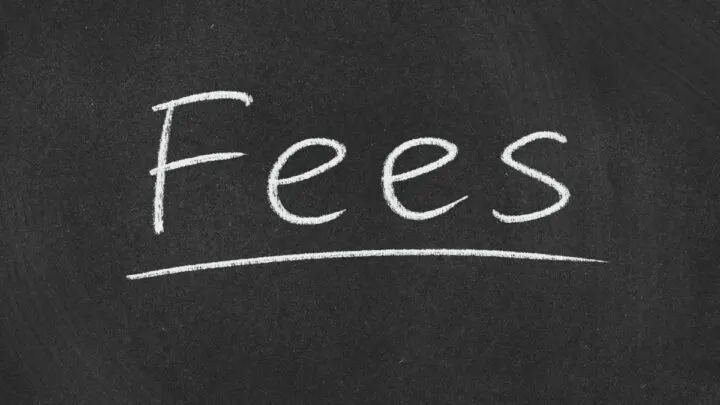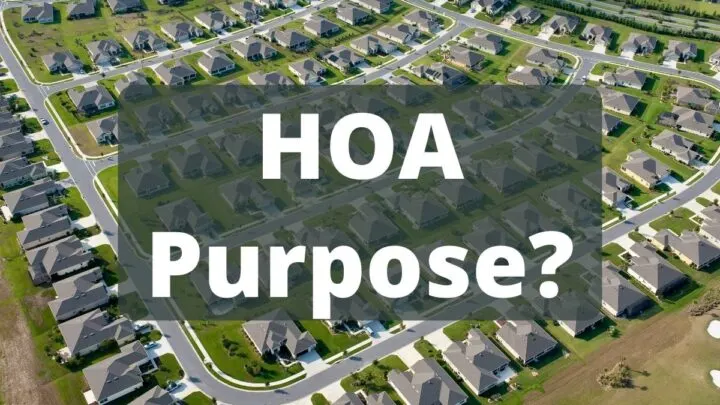Thousands of people around the nation, myself included, are looking to purchase a home. If you’re actively house hunting, you’ve likely noticed that many homes are part of something called a homeowners association (HOA).
If you’re like me, you have heard of an HOA but have no idea what being part of one means. I’ve researched the ins and outs of HOAs and compiled what I’ve learned into this article so that we can answer the question, ‘What does a home owners association do?.
What Does HOA Stand For?
HOA is an abbreviation for “homeowners association.” Homeowners associations make and enforce rules and regulations that members within the HOA’s jurisdiction must follow.
To be a part of a homeowners association, you typically pay fees. These fees are usually every month or every year. In return, the HOA provides you with a strong and safe community.
Homeowners associations are typically run by a group of people living in the community called a board of directors. These directors are elected by a set of Bylaws governed by the state that determine how many directors make up the board, and how positions may be filled in the event that a board member resigns.
This board of directors writes the rules and guidelines for all homeowners in the area and enforces them using a series of warnings and fines for non-compliant members of the HOA.
HOA Purpose and Responsibilities
While many people typically aren’t fond of the idea of a homeowners association, HOAs have many benefits that go unnoticed and unappreciated.
Responsibilities of a homeowner’s association include the following and more:
- Property management
- Enforcing community rules
- Community maintenance
- Budget management
The primary purpose of a homeowners association is to provide a strong community and ensure that the members of that community are safe and well taken care of. The board of directors is responsible for handling all duties and responsibilities associated with providing for the community.
The board of directors can either handle property management and maintenance on its own or hire workers to come in and handle these tasks.
Tasks associated with property management and community maintenance include keeping common areas clean, mowing and lawn care, pool maintenance, and performing repairs to community property such as playgrounds or tennis courts.
If you are part of a condominium homeowners association, property management also provides repairs and pest control for your home.
HOAs are also responsible for managing the cost of providing services and amenities. Once a community member has paid their HOA fees for the month, those fees go into an account that pays for amenities and maintenance within the community.
Homeowners associations are responsible for deciding exactly what to spend these fees on. Many HOAs use the pooled costs to pay for amenities like pools, tennis courts, playgrounds, and more. These fees can also pay for a gate and security for the community.
An HOA’s board of directors is responsible for enforcing the community’s governing documents.
The board is responsible for both code and rule enforcement.
If a community member breaks code or breaks one of the rules outlined in the guide, then that member is subject to fines from the HOA. Fines are deemed as reasonable by the HOA and typically range between $25-$100 with a cap of $1000, however, this can vary from state to state.
Having a governing body to enforce the community’s rules provides a greater sense of security within your community and keeps the community appealing to newcomers.

HOA Fees
Homeowners associations exist in many types of residential communities, including suburbs, groups of single-family homes, and condominiums. To live in an HOA-governed area, you must pay HOA fees.
HOA fees help fund the cost of maintaining your community as well as providing amenities and common areas.
Some of the most common amenities and services that HOA fees fund are:
- Maintenance, such as road plowing, gardening, mowing, and cleaning
- Insurance for public and common areas
- Pest control (if you are part of a condominium HOA)
- Utility services, such as garbage, sewage, and water
- Building and maintaining common areas like pools, tennis courts, etc.
Part of your HOA fees will go into something called a reserve, which provides a backup source of money in case of extreme or unexpected expenses.
Many suburban homeowners associations use HOA fees to establish a gated community in which homeowners in the area receive a gate code to get in and out of the community.
Having a gated community helps homeowners feel safer and have a stronger sense of security within their community. In some instances, these fees even pay for a security guard to watch the gate.
HOA Board of Directors
To better understand how a homeowners association works and what it does, it’s essential to know how the board of directors works.
Members of an HOA can get elected to the board if they meet the following requirements:
- They have no history of delinquent fees.
- They have never had any action brought against them for violating the HOA guidelines.
- They have no current legal disputes.
- They can not be related to any current board members.
Being on an HOA’s board of directors is a fiduciary position and does not pay. Because it isn’t a paying position, members of the HOA must trust the board of directors to make the right decisions based on loyalty.
The board of directors makes all final decisions concerning the HOA’s governing documents, and the board is responsible for enforcing these guidelines.
The board also makes all financial decisions for the HOA. While community members can vote on spending their pool of HOA fees, the board has the final say.
The board is also responsible for performing or hiring workers to perform regular maintenance on community property.

Can an HOA Kick You Out?
When you purchase a home that is part of a homeowners association, you are essentially signing a contract that will abide by that community’s rules.
That being said, an HOA doesn’t have the power to outright kick you out of your home like a landlord would a tenant. They can, however, take legal action in other ways if you’re not following community rules.
Usually, when a resident is non-compliant with community guidelines, the HOA will provide several warnings before taking legal action.
Once you’ve received an extensive number of warnings, the board of directors can take legal action to enforce community rules. If you are non-compliant with community guidelines, the board of directors can do one of three things:
- Fine you for non-compliance
- File a lien on your home
- Force your home into foreclosure
Once you receive a fine from the HOA, you are responsible for paying that fine promptly. If you refuse to do so or continue to break community rules after, the HOA will steadily increase the amount of money you get fined.
After a certain point of non-compliance, the HOA can seek more extreme legal action.
If you have received multiple fines from the HOA or have not paid your fees, you are subject to the HOA filing for a lien on your home. What this means is that the HOA will have a legal claim to your property, which can make selling your home in the future very difficult to do.
The most extreme measures that an HOA can take is to force your home into foreclosure because of non-compliance and refusal to pay HOA fees. The HOA can use the previously placed lien on your property to have a legal basis for the foreclosure.
So, in short, yes, an HOA can force you out of your home if you receive multiple fines or refuse to pay annual fees, but it is a lengthy legal battle to do so.


